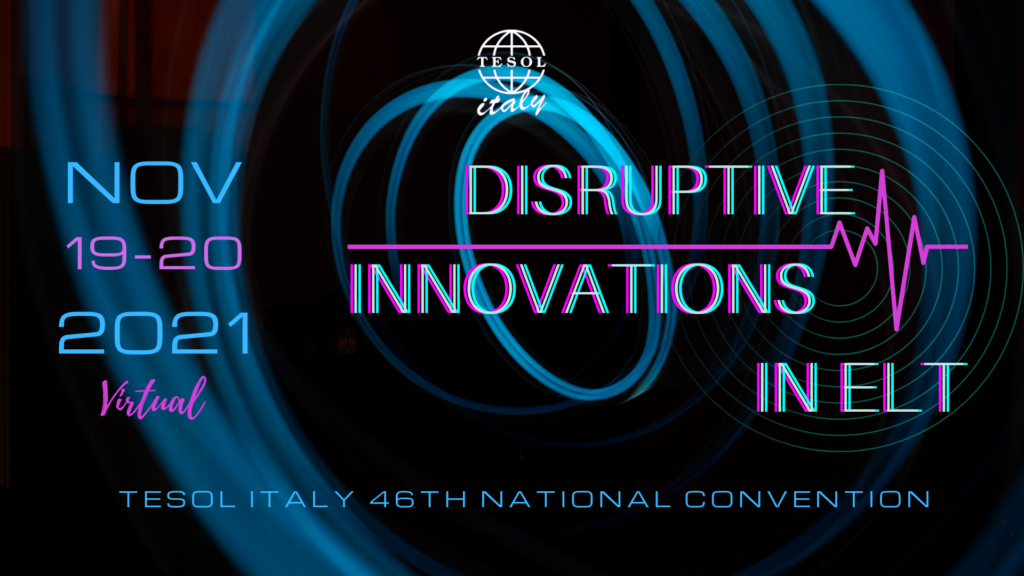
TESOL Italy’s 46th National Convention, provocatively entitled “Disruptive Innovations in ELT” echoing Clayton M. Christensen’s famous theory, wishes to provide a shared space for inquiry, reflection and discussion on the disruptive impact caused by the COVID-19 pandemic, which has turned our personal and professional lives upside down changing education dramatically, while also leading to positive innovations and transformations. In this sense, we have used the term ‘disruptive innovations’ as they have caused a paradigm shift in the ELT field.
How have we, as ELT teachers, educators and professionals, coped with change? How have we reacted to the pandemic disruption? Our responses have actually been disruptive and extraordinary, turning unprecedented challenges into opportunities and reimagining English learning and teaching:
- adapting to virtual / hybrid environments, dealing with online challenges and digital overwhelm, using new interactive e-learning platforms;
- enhancing online collaboration and sharing experiences and resources;
- building relationships and communities of practice;
- adjusting teaching methods, strategies and content to the changed scenario;
- rethinking assessment systems and feedback practices;
- experimenting and adopting new ways of teaching and learning, and finding innovative, creative and inclusive solutions within and beyond the classroom to meet learners’ new needs;
- responding to ever-growing multilingual challenges and adopting translanguagism as a perspective and pedagogical approach in ELT;
- fostering sustainable development and social justice, and promoting students’ agency and empowerment;
- developing resilience, collaboration, empathy, digital literacy, soft skills, global competencies while enriching professional profiles.
In our two-day event, we will explore the pedagogical implications and applications of current disruptive innovations in ELT by focusing on the latest trends and approaches, and providing examples of best practices and experiences.
STEPS IN SUBMITTING A PRESENTATION PROPOSAL
The deadline for submitting speaker proposals is July 10th, 2021.
In preparing your proposal, please bear the following in mind:
1
Adapt your presentation either to the convention theme or to one of the subthemes
2
Submit one proposal only
3
Provide all the requested information. Incomplete proposals will not be accepted
4
Respect word/character counts for title, biodata, abstract and summary
5
Send a profile photo to be published in the Convention E-Program
PLEASE NOTE
1. TESOL Italy is unable to reimburse speakers for expenses. All presenters are kindly requested to pre-register for the Convention and cover the required fees (membership and participation fees), thereby establishing their membership to TESOL Italy.
2. The time allocated for each presentation is 30 minutes.
3. Types of presentations:
Workshop: speaker introduces a topic with a mini-lecture, and guides active participation of the audience;
Talk: speaker describes and discusses theoretical/practical issues related to the themes of the Convention;
Demonstration: speaker shows how certain materials, techniques, etc. can work in a classroom;
Panel: three or more speakers present their ideas on a topic followed by a Q&A session with the audience;
Poster Session: speaker presents posters with pictures, charts and/or realia, and shares ideas with attendees;
Commercial Presentation: speaker promotes materials published and advertised at the Virtual Book Exhibition.
4. Professional/ Biographical background: please avoid references to personal websites, lists of course-books or other personal commercial activities, as they will be removed in the editing phase.
Please note that TESOL Italy will not accept proposals which do not conform to the guidelines above.
Deadlines Summary
- Proposal Submission: July 10th, 2021
- Paper Acceptance Notification by TESOL Italy: July 31st, 2021
- Speaker’s Contribution Fee Deadline: September 20th, 2021
